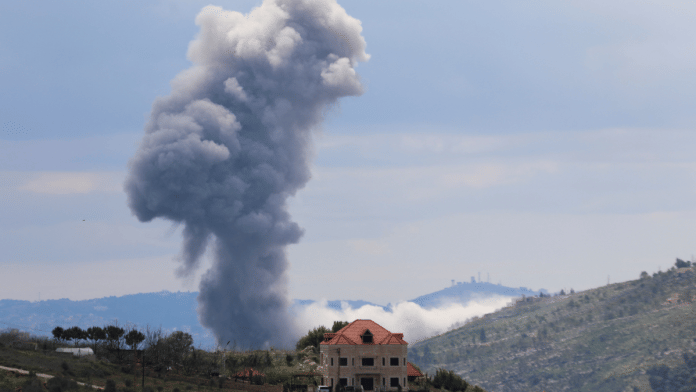Beirut/Jerusalem: Israeli artillery and airstrikes hit south Lebanon on Saturday after Israel said it had intercepted rockets fired from across the border, endangering a shaky truce that ended a year-long war between Israel and Lebanese armed group Hezbollah.
That conflict marked the deadliest spillover of the Gaza war, rumbling across the border for months before escalating into a blistering Israeli offensive that wiped out Hezbollah’s top commanders, many of its fighters and much of its arsenal.
Hezbollah denied responsibility, saying it had “no link” to the rocket launches and that it remained committed to the ceasefire. No group has claimed responsibility for the attack.
Saturday’s exchange was the first since Israel in effect abandoned a separate ceasefire in the Gaza Strip with Palestinian militant group Hamas, an ally of Hezbollah, both backed by Israel’s arch-foe Iran.
The Israeli military said early on Saturday it had intercepted three rockets launched from a Lebanese district about six km (four miles) north of the border towards the Israeli border town of Metula, the second cross-border launch since a U.S.-brokered ceasefire in November ended the fighting.
In retaliation, Israeli Prime Minister Benjamin Netanyahu ordered the military to “act forcefully against dozens of terror targets in Lebanon”, Netanyahu said in a statement.
The Israeli military, in a separate statement, said it had struck dozens of Hezbollah rocket launchers and a command centre from which the group’s militants had been operating, in southern Lebanon.
Hezbollah did not immediately respond to a Reuters request for comment.
Lebanon’s state news agency reported a spate of Israeli airstrikes and artillery barrages in the country’s south, including border towns and hilltops around eight km inside Lebanese territory.
Two people were killed and eight wounded by Israeli airstrikes in the south near the border, the state news agency NNA said, quoting Lebanon’s health ministry.
There were no reports of casualties in Israel. In Gaza, health authorities said three Palestinians had been killed in an Israeli airstrike on a house in Beit Lahiya. The Israeli military said it was looking into the report.
UN SAYS SITUATION ‘VOLATILE’
Under the November ceasefire deal, Hezbollah was to have no weapons in southern Lebanon, Israeli ground troops were to withdraw and Lebanese army troops were to deploy into the area.
The agreement specifies that Lebanon’s government is responsible for dismantling all military infrastructure in southern Lebanon and confiscating all unauthorised arms.
President Joseph Aoun ordered the Lebanese army to secure “any violation” that could threaten stability in Lebanon. The army said it had found and dismantled three “primitive rocket launchers” in the south.
Netanyahu said Israel was holding Lebanon’s government responsible for “everything taking place within its territory. Israel will not allow any harm to its citizens and its sovereignty – and will do everything in its power to ensure the safety of the citizens of Israel and the communities of the North.”
The United Nations peacekeeping force in Lebanon, known as UNIFIL, said in a written statement on Saturday that it was “alarmed” by the border violence.
“Any further escalation of this volatile situation could have serious consequences for the region,” it said.
Prime Minister Nawaf Salam warned of a renewal of military operations in the south of Lebanon. “All security and military measures must be taken to show that Lebanon decides on matters of war and peace,” he said in a statement.
The ceasefire brought an end to Israel’s intense bombardment and ground operations in Lebanon and Hezbollah’s daily rocket barrages into Israel. Each side, however, has accused the other of failing to implement the deal in full.
Israel says Hezbollah still has military infrastructure in the south, while Lebanon and Hezbollah say Israel is occupying Lebanese land by continuing to carry out some airstrikes and keeping its troops at five hilltop positions near the frontier.
(Reporting by Maya Gebeily in Beirut and Maayan Lubell in Jerusalem; additional reporting by Nidal al-Mughrabi, Menna Alaa El Din, Jaidaa Taha and Enas Alashray in Cairo; editing by Tom Hogue, Mark Heinrich and Timothy Heritage)
Disclaimer: This report is auto generated from the Reuters news service. ThePrint holds no responsibility for its content.






